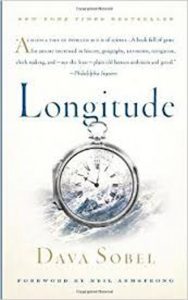Fecha última actualización 28/07/2018 por El Viajero Accidental
 I like stories about the sea and the men who venture into it. From whaling to warfare, I find the sea enormously attractive, even though I get terribly sick almost as soon as I set foot on board.
I like stories about the sea and the men who venture into it. From whaling to warfare, I find the sea enormously attractive, even though I get terribly sick almost as soon as I set foot on board.
One of my favourite books is The shadow line by Joseph Conrad and I keep watching The perfect storm over and over again. While on holidays this summer, we stopped by chance at Mystic Seaport (Connecticut), a small whaling port now turned into a historic site. I came across this book at the souvenirs shop and I thought that it could make good summer reading. And it certainly does.
I had never thought that determining the exact position of a boat at sea was done so primitively until the 17th century. Admirals and explorers were truly blind when it came to determining how east or west they were from their starting point. The tools were basic at best and the consequences of their inaccuracy were the lost lives of whole crews. That is the starting premise for the book and the plot revolves around how the world powers of the time tried to solve that problem. The central character is John Harrison, an English carpenter and clockmaker who manufactured the first marine timekeepers in his pursuit to win the reward set by the English Longitude Act of 1714.
The technical advances in astronomy and clock craftmanship of the 16th and 17th centuries are unlikely to make light or best selling reading. But Dava Sobel goes beyond that obstacle, she turns the story of John Harrison and his first marine chronometer, into a race for glory and wealth. And her account of the political intrigues at the Royal Society describe how an emerging power like the Britain of that time understood very well that technology could be the foundation of their future preeminence. It is that mix of politics, science and ambition that ultimately made the Royal Observatory at Greenwich the centre of the world.
Dava Sobel’s style is easy to follow, she does not get lost in complicated technical explanations. She does not focus solely on the race for money and recognition, but also on the impact this issue had on the big personalities of the time (e.g. John Cook, King George III). Her book appeals to those who enjoy history, marine stories, politics…and clock-making.
It is a really good book.
Nota del autor: “No he recibido ningún tipo de compensación (económica o no) por escribir este artículo, no tengo conexión material con las marcas, productos o servicios que he mencionado y mi opinión es independiente”









Habrá que leerlo…: gracias por la recomendación